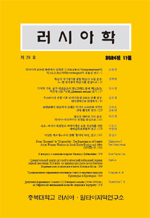Русская литература как средство формирования устойчивой мотивации в контексте CLIL
Russian Literature as a Means of Developing Sustainable Motivation in the Context of CLIL
- 충북대학교 러시아 알타이지역 연구소
- 러시아학
- 제30호
-
2025.05317 - 362 (46 pages)
-
DOI : 10.24958/rh.2025.30.317
- 3

This article explores the potential of Russian literary texts as a means of fostering sustainable learning motivation within the framework of Content and Language Integrated Learning (CLIL). In the context of teaching Russian as a foreign language outside the target-language environment - particularly within the Korean educational setting - the search for methodologies that integrate language development with cognitive, cultural, and personal engagement becomes especially relevant. The study focuses on Yury Olesha’s novella Envy as a literary work that enables the implementation of CLIL principles, including Bloom’s taxonomy and the hermeneutic approach to reading. The article examines the cultural and historical preconditions for the reception of Russian literature in Korea, highlighting the role of the classical canon and the significance of works that engage in dialogue with the tradition of Russian intellectual prose. Particular attention is given to the process of goal internalization, the transformation of external stimuli into personally meaningful motivation, considered through the lens of Zoltán Dörnyei’s L2 Motivational Self System and relevant Russian-language pedagogical research. A pedagogical analysis of the linguistic and stylistic features of Olesha’s text is provided, alongside a range of exercises aimed at developing students’ linguistic, intercultural, and metacognitive skills. The article argues that literary texts can serve as a meaning-generating component of the educational process, contributing not only to the development of communicative skills but also to the activation of analytical thinking, emotional response, and critical engagement with content. The proposed methodology demonstrates the integration of content, language, culture, and cognition within the CLIL model and offers sample tasks aligned with Bloom’s taxonomy and the four core CLIL components (content, communication, cognition, culture). The findings of the theoretical study support the conclusion that incorporating literature into the educational process significantly enhances learner motivation, particularly at intermediate and advanced stages of language acquisition. CLIL, approached through literature, creates a space for meaningful dialogue between language and personal identity, establishing a distinctive educational environment. The article presents a new set of didactic tools and outlines directions for further research into motivational mechanisms in Russian language learning through literary engagement.
Настоящая статья посвящена исследованию потенциала русской художественной литературы как средства формирования устойчивой учебной мотивации в рамках технологии CLIL (Content and Language Integrated Learning). В условиях преподавания русского языка как иностранного вне языковой среды — в частности, в корейском образовательном контексте — особую значимость приобретает поиск методик, сочетающих развитие языковых компетенций с когнитивной, культурной и личностной вовлечённостью учащихся. В центре внимания — повесть Юрия Олеши «Зависть» как литературный текст, позволяющий реализовать принципы CLIL, в том числе на основе таксономии Блума и герменевтического подхода к чтению. Проанализированы культурно-исторические предпосылки восприятия русской литературы в Корее, указана роль классического канона и актуализировано значение произведений, входящих в диалог с традицией русской интеллектуальной прозы. Особое внимание уделяется вопросу интериоризации учебных целей, превращению внешнего стимула в личностно значимую мотивацию, что рассматривается через призму концепции мотивационного «Я» З. Дёрнеи и трудов отечественных учёных. Приведён педагогический анализ лингвистических и стилистических особенностей текста Ю.Олеши, выделены упражнения, способствующие развитию языковых, межкультурных и метакогнитивных навыков. В статье подчеркивается, что художественный текст может выступать смыслообразующим звеном учебного процесса, позволяющим не только формировать речевые навыки, но и активизировать аналитическое мышление, эмоциональный отклик и критическое отношение к содержанию. Представленная методика иллюстрирует возможности интеграции содержания, языка, культуры и когниции в рамках CLIL и предлагает примеры заданий, основанных на уровнях таксономии Блума, а также на концепции четырёх компонентов CLIL (content, communication, cognition, culture). Результаты теоретического исследования позволяют утверждать, что включение литературы в образовательный процесс может существенно повысить мотивацию учащихся, особенно на среднем и продвинутом этапе овладения языком. CLIL в литературном ключе создаёт пространство для живого диалога между языком и личностью, создавая особое о�
I. Введение
II. Основная часть
III. Заключение
Литература
(0)
(0)